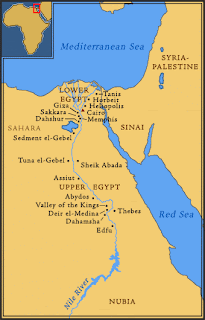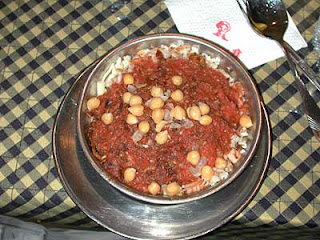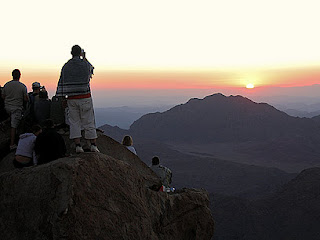Geography:

At 1,001,450 square kilometers (386,660 sq mi), Egypt is the world's 38th-largest country. In terms of land area, it is approximately the same size as all of Central America, twice the size of France, four times the size of the United Kingdom, and the combined size of the US states of Texas and California.
Nevertheless, due to the aridity of Egypt's climate, population centres are concentrated along the narrow Nile Valley and Delta, meaning that approximately 99% of the population uses only about 5.5% of the total land area.
The Coastline of Alexandria, Egypt's second largest city
Egypt is bordered by Libya to the west, Sudan to the south, and by the Gaza Strip and Israel to the east. Egypt's important role in geopolitics stems from its strategic position: a transcontinental nation, it possesses a land bridge (the Isthmus of Suez) between Africa and Asia, which in turn is traversed by a navigable waterway (the Suez Canal) that connects the Mediterranean Sea with the Indian Ocean via the Red Sea.The Nile River in Egypt
Apart from the Nile Valley, the majority of Egypt's landscape is a desert. The winds blowing can create sand dunes more than 100 feet (30 m) high. Egypt includes parts of the Sahara Desert and of the Libyan Desert. These deserts were referred to as the "red land" in ancient Egypt, and they protected the Kingdom of the Pharaohs from western threats.
Towns and cities include Alexandria, one of the greatest ancient cities, Aswan, Asyut, Cairo, the modern Egyptian capital, El-Mahalla El-Kubra, Giza, the site of the Pyramid of Khufu, Hurghada, Luxor, Kom Ombo, Port Safaga, Port Said, Sharm el Sheikh, Suez, where the Suez Canal is located, Zagazig, and Al-Minya. Oases include Bahariya, el Dakhla, Farafra, el Kharga and Siwa. Protectorates include Ras Mohamed National Park, Zaranik Protectorate and Siwa. See Egyptian Protectorates for more information.
Satellite image of Egypt, generated from raster graphics data supplied by The Map Library
Climate:
Egypt does not receive much rainfall except in the winter months. South of Cairo, rainfall averages only around 2 to 5 mm (0.1 to 0.2 in) per year and at intervals of many years. On a very thin strip of the northern coast the rainfall can be as high as 410 mm (16 in), with most of the rainfall between October and March. Snow falls on Sinai's mountains and some of the north coastal cities such as Damietta, Baltim, Sidi Barrany, etc. and rarely in Alexandria, frost is also known in mid-Sinai and mid-Egypt. Temperatures average between 80 °F (27 °C) and 90 °F (32 °C) in summer, and up to 109 °F (43 °C) on the Red Sea coast. Temperatures average between 55 °F (13 °C) and 70 °F (21 °C) in winter. A steady wind from the northwest helps hold down the temperature near the Mediterranean coast. The Khamaseen is a wind that blows from the south in Egypt in spring, bringing sand and dust, and sometimes raises the temperature in the desert to more than 100 °F (38 °C).
Every year, a predictable flooding of the Nile replenishes Egypt's soil. This gives the country consistent harvest throughout the year. Many know this event as The Gift of the Nile.
Foreign Relations:
Egypt's foreign policy operates along a non-aligned level. Factors such as population size, historical events, military strength, diplomatic expertise and a strategic geographical position give Egypt extensive political influence in the Middle East, Africa, and within the Non-Aligned Movement as a whole. Cairo has been a crossroads of Arab commerce and culture for millennia, and its intellectual and Islamic institutions are at the center of the region's social and cultural development.
Relations with the European Union
Relations in the Middle East:
Arab relations
Relations with Africa
Relations with Israel:
Being a pioneer of peace making in the region and driven from its belief that a peaceful Middle East is the best solution for the development of Egypt, the third Egyptian President Anwar Sadat's groundbreaking trip to Israel in 1977, the 1978 Camp David Accords, and the 1979 Egypt-Israel Peace Treaty represented a fundamental shift in the politics of the region; from a strategy of confrontation to one of peace as a strategic choice. Egypt was subsequently ostracized by other Arab states and ejected from the Arab League from 1979 to 1989.
However, due to circumstances of today's Israeli-Palestinian conflict, full normalization of relations between these two countries is still halted and sometimes fought against in both countries. The Egyptian ambassador to Tel Aviv is often withdrawn, and the peace has been called a cool peace due to the Israeli-Palestinian conflect.
Relations with Iran:
Since the Islamic Revolution, Egypt's diplomatic relations with Iran have mostly been strained. Contentious issues include Egypt's support for Iraq in Iran's eight-year conflict, the Islamic Republic's hailing of Khalid Islambouli, the late President Anwar Sadat's assassin as a religious hero (seeing as there was both a street and mural named after him), and close Egyptian relations with the United States, most of the Western World countries, and Israel. However as of 2007, relations between the two have thawed in the fields of diplomacy and economic trade.
Relations with India
Relations with the United States
Relations with Asia.
Religion:
Religion in Egypt controls many aspects of social life and is endorsed by law. Egypt is predominantly Muslim, with Muslims comprising about 90% of a population of around 80 million Egyptians Almost the entirety of Egypt's Muslims are Sunnis. A significant number of Muslim Egyptians also follow native Sufi orders, and there is a minority of Shi'a.
Most of the non-Muslims in Egypt are Christians. Christians represent around 10% of the population and are the largest Christian community in the Middle East. About 90% of Christians in Egypt belong to the native Coptic Orthodox Church of Alexandria. Other native Egyptian Christians are adherents of the Coptic Catholic Church, the Coptic Evangelical Church and various Coptic Protestant denominations. Non-native Christian communities are largely found in the urban regions of Cairo and Alexandria.
There is also a small, but nonetheless historically significant, non-immigrant Bahá'í population around 2000, and an even smaller community of Jews of about 200, then a tiny number of Egyptians who identify as atheist and agnostic. The non-Sunni, non-Coptic communities range in size from several hundreds to a few thousand. The original Ancient Egyptian religion has all but disappeared.
In Egypt, Muslims and Christians live as neighbors, they share a common history and national identity. They also share the same ethnicity, race, culture, and language.
Religion plays a central role in most Egyptians' lives, The Adhan (Islamic call to prayer) that is heard five times a day has the informal effect of regulating the pace of everything from business to media and entertainment. Cairo is famous for its numerous mosque minarets and is justifiably dubbed "the city of 1,000 minarets", with a significant number of church towers. This religious landscape has been marred by a history of religious extremism, recently witnessing a 2006 judgement of Egypt's Supreme Administrative Court, which made a clear legal distinction between "recognized religions" (i.e., Islam, Christianity, and Judaism) and all other religious beliefs. This ruling effectively delegitimizes and forbids practice of all but the three Abrahamic religions. This judgment had made it necessary for non-Abrahamic religious communities to either commit perjury or be denied Egyptian identification cards (see Egyptian identification card controversy), until a 2008 Cairo court case ruled that unrecognized religious minorities may obtain birth certificates and identification documents, so long as they omit their religion on court documents.
Culture:
Egyptian culture has five thousand years of recorded history. Ancient Egypt was among the earliest civilizations and for millennia, Egypt maintained a strikingly complex and stable culture that influenced later cultures of Europe, the Middle East and other African countries. After the Pharaonic era, Egypt itself came under the influence of Hellenism, Christianity, and Islamic culture. Today, many aspects of Egypt's ancient culture exist in interaction with newer elements, including the influence of modern Western culture, itself with roots in ancient Egypt.
Egypt's capital city, Cairo, is Africa's largest city and has been renowned for centuries as a center of learning, culture and commerce. Egypt has the highest number of Nobel Laureates in Africa and the Arab World. Some Egyptian born politicians were or are currently at the helm of major international organizations like Boutros Boutros-Ghali of the United Nations and Mohamed ElBaradei of the IAEA.
Popular Sports:
Football (soccer) is the national sport of Egypt.
Language:
Arabic.
Egyptian is a branch of the Afro-Asiatic language family along with the Chadic, Berber, Semitic, Cushitic and possibly Omotic languages. Written records of the Egyptian language have been dated from about 3400 BC, making it one of the oldest recorded languages known. Egyptian survived until the 5th century AD in the form of Demotic and until the late 17th century AD in the form of Coptic. The national language of modern-day Egypt is Egyptian Arabic, which gradually replaced Coptic as the language of daily life in the centuries after the Muslim conquest of Egypt. Coptic is still used as the liturgical language of the Coptic Church. It reportedly has a handful of native speakers today.
Currency:
Egyptian Pound.
Figures of Egypt:
Ahmad shawqi ( A Poet)
Ahmad zewiel ( A Scientist, won the Nobel Prize in Physics)
Naguib Mahfouz (A writer, won the Nobel Prize in Literature)
Leila Ahmad ( A Professor of Women’s Studies)
And more………..
Famous Food:
Koshari: it is the most popular food in Egypt. It is a mix of macaroni, rice, lentils, and tomato sauce .
 Koshari
Koshari
Fool Mudammas ( Beans): cooked fava beans, small onion, chopped, A few springs of fresh parsley, teaspoon black pepper.
 Fool Muddammas
Fool Muddammas
People:
The family is the centre of social organization. Every Egyptian is expected to get married and produce children in order to continue the family lineage. When a child is born, the parents’ new role are acknowledged with new titles: The father becomes Abu “father of” the new child, and the mother becomes Um “mother of” the new child. Thus, the parents of a child named Ahmad are known as (Abu Ahmad) and (Um Ahmad), and it’s stays fixed to the oldest son.
Egyptians are very friendly people, and even the poorest among them will show hospitality to a stranger. The Egyptian greeting is typically “as-Salam A’laikom,” or (peace be with you,) and the response is “wa ‘alaikom as-Salam,” or (and peace be with you as well.) Egyptians shake hands upon greeting, although two men or two women might kiss on the cheek. An unmarried man and woman, however, would not kiss due to Muslim and social mores, and a very pious man and woman might not even shake hands.
In formal situations, a man is referred to as Sayyed (Mr.), a married woman as Saiyydah (Mrs.), and a single women as Anisa (Miss.). Anyone with doctorate or Ph.D. or a medical degree is referred to respectfully as “Doctor”, even in informal settings.
Children must show respect for their elders and can never refer to an adult by his/her first name without attaching “aunt” or “uncle” to the name. In some areas, “Abla” (a person with knowledge or teacher) is referred to the big sister.
Egyptian Sense of Humor:
Jokes, light comments and smart replies are many facets of the Egyptian sense of humor, which, in Egypt, is a way of life.
Egyptians laugh at many things. The contradictions of daily life provide them with plenty of material. Every region may also have a unique taste of humor, so what you hear in Cairo would be different from that in Luxor or Alexandria. But all Egyptian jokes aim at one thing only: a smile on the face of the receiver. A laugh is a bonus.
One such joke told by journalists (some say it is an actual story) is the obituary which came in very late one night to be published the following morning. The editor was tired and in a hurry to get home, so he wrote a note on it saying "only if there is a space". There was.
The following morning the obituary was published that Mr. xx died recently.. may God let him into paradise.. only if there is a space!!"
- One kid to another :"Everybody stands up for my father at work".
- What does your father do?
- He is a judge.
- So what. People bow their heads to my dad at work, including your dad!
- Wow, what does he do?
- He is a barber.
A man walked into a supermarket and demanded half a head of lettuce. A boy working there told him that he has to buy the whole lettuce, but the man insists on half a lettuce. The boy went to the manager at the back of the shop and said
- A stupid man out there wants half a lettuce.. then realizing that the man is right behind him, added :..
"and this gentleman here wants to buy the other half!.
Historical Places:
There are many historical, touristic, and entertainment places in Egypt .
1. Historical and touristic Places:
Luxour and Aswan.
2. Entertainment places:
Hurgada, Sharm El-Sheikh, Alexandria, Marsa Matrouh and Sinai.
 Sinai
Sinai
 Sharm El- Sheikh
Sharm El- Sheikh
 Marsa Matrouh
Marsa Matrouh
 Luxour Temple
Luxour Temple
 Karnak Temple
Karnak Temple
 Hurghada
Hurghada
 Aswan
Aswan
 Alexandria
Alexandria

No comments:
Post a Comment